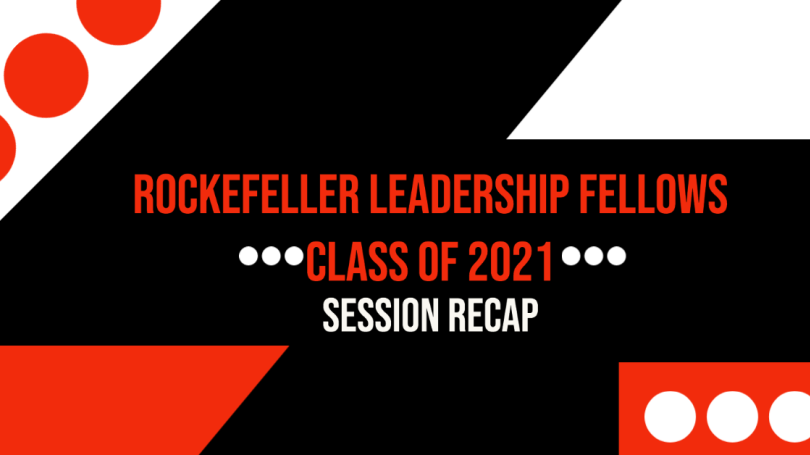
- Public Policy
- Leadership
- Funding
- News & Events
- About the Center
Back to Top Nav
Back to Top Nav
Back to Top Nav
Back to Top Nav
After a fascinating slate of speakers during the winter, RLF ended on a (characteristically) fantastic note with its final session of the term. Dartmouth Class of 1999 alumna Allison Bawden was the speaker for the session, and she focused on skills to help build credibility as a member of an organization and as a leader. As a Director in the U.S. Government Accountability Office (GAO) and past professional experience in auditing, evaluations, and testifying to Congress, Bawden has learned first-hand the importance of impenetrable credibility. Bawden imparted this knowledge to the Fellow during the session, enabling the Fellows to pursue their post-graduation plans equipped with the skills necessary to build credibility in whatever they choose to do.
Currently, the Fellows are at the top of their game as they near the end of their undergraduate education. However, as Bawden noted, the Fellows will soon have this reality drastically altered, finding themselves as some of the least experienced and youngest members in their new jobs or academic programs. Nonetheless, the Fellows will be graduating with valuable skills and experiences that they can draw upon in their new pursuits. The challenge, Bawden explained, is convincing their superiors to trust in their abilities–building credibility, as she called it. According to Bawden, the best strategy to credibility is to first and foremost understand the organization you are joining. The key questions to answer are “What are the organization’s core values?” and “How does the organization define quality?” The answers to these questions should be the guiding compass for all work you produce and decisions you make while working for that company. Bawden asserted that, with consistent dedication to the organization’s core values, supplemented by quality work (according to the organization’s internal definition), you can effectively establish your credibility and earn the trust of your superiors, thereby positioning yourself as a reliable individual who can be trusted to make difficult and important decisions.
To provide the Fellows an opportunity to practice “understanding and diagnosing” an organization, the Fellows were split into four groups, with each assigned a different organization undergoing an identity crisis of some kind. The tasks of the groups were to, first, identify the organization’s core values and definition of quality, and second, determine how the organization should respond to the identity crisis in light of these core values and definition of quality.
Following the large-group discussion on each groups’ responses to the prompt, Bawden offered a few additional questions for the Fellows to ponder upon joining a new organization: How can you tell if you are building trust and credibility? What actions can you take to speed these processes? What behaviors would be impediments to demonstrating quality work and building trust? In addition, Bawden suggested that, should the Fellows find themselves disliking their work, it might be because their organization’s core values do not integrate well with their personal values. Thankfully, after a number of the prior sessions which focused on assessing personal values, the Fellows are now well-prepared to predict such an occurrence and thus hopefully avoid joining organizations that are not good fits.
-Written by Maria Smith-Lopez, Class of 2021 Rockefeller Leadership Fellow and Student Program Assistant
As Rockefeller Leadership Fellows, seniors gain a better understanding of the qualities and responsibilities expected of leaders. As Fellows take part in the workshops, discussions, and team-building exercises, they examine their skills, qualities, and attributes as leaders and analyze how these influence teamwork and achieving goals.